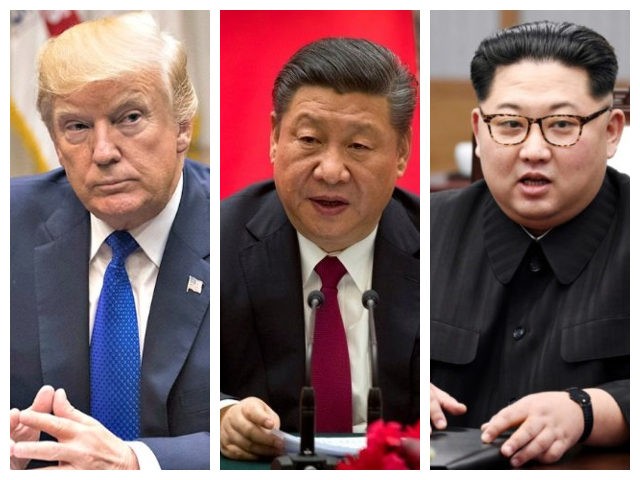China is looking to assert a more prominent role as “guarantor” of anticipated “symbolic deals” after negotiations between U.S. President Donald Trump and North Korean dictator Kim Jong-un began in Singapore on Tuesday, the South China Morning Post (SCMP) reports.
It is no secret that China helped to facilitate the historic June 12 Trump-Kim summit in Singapore. The U.S. has vowed to keep the pressure on North Korea until it agrees to denuclearize.
Confirming what occurred during the unprecedented summit on Tuesday, the state-owned Korean Central News Agency (KCNA) asserted that the two leaders would discuss a “permanent and durable peace-keeping mechanism” on the Korean Peninsula, denuclearization of the Korean peninsula, and other issues of concern to the two nations, SCMP reported. KCNA has not yet reported at press time on the summit since it transpired.
North Korea’s confirmation that denuclearization is on the table comes days after several experts like Dr. Victor Cha from the Center for Strategic and International Studies (CSIS) cast doubt on Kim’s commitment to denuclearization during a Senate panel hearing on June 5.
Others, such as Joseph Y. Yun from the U.S. Institute of Peace, told lawmakers that Kim recognizes a deal with the United States is essential for the survival of his regime, which has been devastated by the international sanctions.
Citing experts are acknowledging that China is pushing to play the roles of “guarantor” and “mediator” after the meeting on Tuesday, the Morning Post noted:
Chinese analysts agreed that Beijing could and would play a larger role following the summit between Kim and Trump, who – given their divergent views on denuclearization – are expected to make some “symbolic deals” when they meet.
Those deals could include an agreement to keep talking, with a commitment to work towards a final goal of dismantling all nuclear weapons on the Korean peninsula, and an announcement to end hostility.
“If that’s the case, Beijing will have a role to play on how to implement the deals,” Cheng Xiaohe, an associate professor of international relations at Renmin University in Beijing, told SCMP. “That includes inspecting the North Korean nuclear shutdown, as well as a role in the economic development Kim is seeking for his country.”
Lu Chao, a Korean affairs specialist at the Liaoning Academy of Social Sciences, also noted that Beijing expects to play a role in the planned process of denuclearization, which Joseph Y. Yun from the U.S. Institute of Peace predicted last week could take “ten years,” give or take.
“China will help both sides to meet their promises – it will be a guarantor and a mediator to ensure that any deals that are made at the summit are well implemented,” Lu told the Morning Post.
Beijing is North Korea’s largest trading partner and closest ally, a relationship Trump has recognized throughout the negotiations that led to Tuesday’s summit.
President Trump has thanked China for using its leverage to bring North Korea to the table.
“I applaud China for breaking off all banking relationships with North Korea, something that people would have thought unthinkable even two months ago,” Trump said in September 2017, adding, “I want to thank President Xi.”
It appears both Trump and Kim have sought Xi’s advice on the summit talks, a testament to China’s “indispensable role in negotiating any change to the major geopolitical currents in Asia,” as the Associated Press (AP) described the situation.
Zhao Tong, a North Korea specialist at the Carnegie-Tsinghua Center for Global Policy in Beijing, told SCMP that any positive result from the summit is likely to benefit China.
Tong noted that a unified Korea would mean a leaner American presence, which Beijing would gladly welcome. Fewer tensions in North Korea also mean one less thing for China to worry about along its borders.

COMMENTS
Please let us know if you're having issues with commenting.